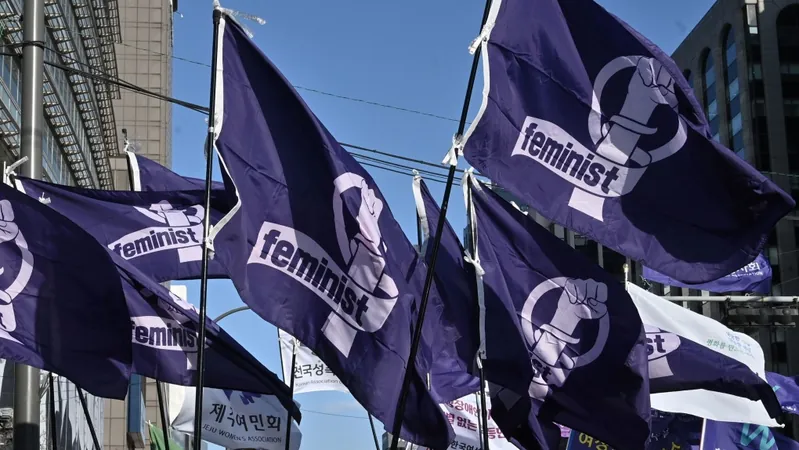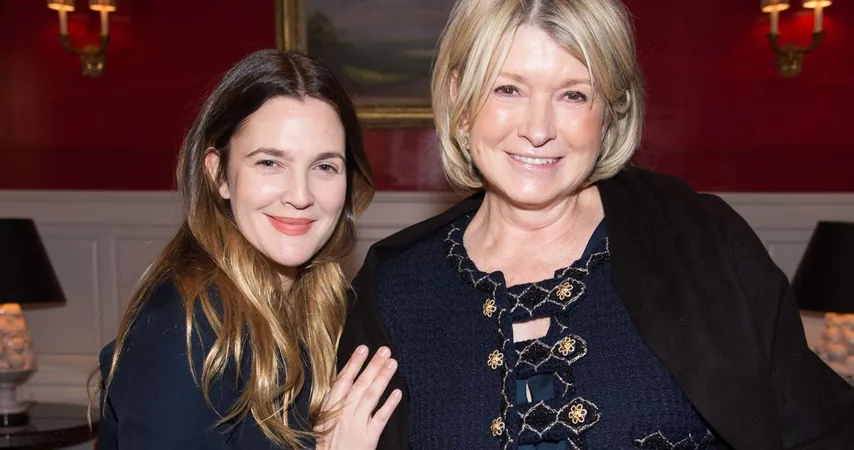
The 4B Movement Gains Traction Among American Women Following Trump's Re-election
2024-11-11
Author: Jacob
In the wake of Donald Trump's re-election as president of the United States, a surprising trend has emerged among young liberal women in America: a renewed interest in the 4B movement, a feminist initiative originally developed in South Korea. This has sparked heated discussions across platforms like TikTok and Instagram, where women are vocalizing their frustrations and solidarity in the face of a political landscape they feel no longer represents nor protects them.
The 4B movement, which stands for “no marriage, no childbirth, no dating, and no sex with men” in Korean, began gaining traction in South Korea around 2015. It arose as a response to the persistent gender inequality and violence women face in a society that has been dogged by a troubling history of misogyny. The movement is rooted in the #MeToo wave, reacting to a cultural backdrop where women were outraged by incidents such as the brutal murder of a woman outside a Seoul subway station in 2016, a crime fueled by the perpetrator's sentiments towards women.
According to data from the Organisation for Economic Co-operation and Development, South Korean women earn approximately one-third less than their male counterparts, making it the highest wage gap among OECD nations. Despite living in one of the world's most advanced economies, women's representation in senior roles remains glaringly low.
The rejuvenated interest in 4B in the U.S. stems from dissatisfaction with male-dominated political leadership that many women feel perpetuates a culture of sexism. "We have pandered and begged for men’s safety and done all the things that we were supposed to, and they still hate us,” says Ashli Pollard, a 36-year-old St. Louis resident advocating for women to prioritize themselves over societal expectations regarding men.
Though the 4B movement was once a fringe concept, its sentiments resonate with many women who are now reassessing their relationships with men, opting instead for empowerment and independence. Many are taking to social media to express their intent to boycott relationships with men or refuse emotional labor that has traditionally been expected from women.
Pollard, who has chosen not to date or engage with men since 2022, views her journey not as vengeful but as an empowering shift towards self-care and prioritizing her needs. Similarly, Alexa Vargas from Boston, who has steered clear of men following abusive relationships, advocates for women’s self-protection and healing, hoping the evolving conversations can inspire a greater sense of community among women.
Despite the optimism surrounding 4B's potential to instigate change, experts suggest that while sentiments may resonate, the movement might not achieve mainstream traction in the U.S. due to its binary nature and because it does not fully take into account the diversity of women's experiences, including those who supported Trump's presidency.
Hadia Khanani, a 24-year-old from Florida, emphasizes the need for deeper examination into the structures supporting patriarchy. “Misogyny is much deeper than just interactions with men; it's institutional," she points out.
While many women are exploring the implications of choosing not to engage with men, the broader challenge ahead remains: how to dismantle ingrained patriarchy and misogyny that extends beyond personal relationships. Yet, there's hope that the recent discussions facilitated by the fascination with the 4B movement can bolster women’s unity and awareness around the shared struggles for equality and justice.
As activism continues to evolve both in South Korea and the U.S., many women are finding ways to fight back against systemic oppression, aiming for a future where empowerment and solidarity propel them forward. The 4B movement, whether it takes on a life of its own in America or not, serves as a conversation starter, fostering awareness about the greater fight for gender equality that transcends borders.
With women choosing their joy and autonomy, one thing is certain: the conversation around women’s rights, safety, and empowerment is more vital than ever, and it is far from over.









 Brasil (PT)
Brasil (PT)
 Canada (EN)
Canada (EN)
 Chile (ES)
Chile (ES)
 España (ES)
España (ES)
 France (FR)
France (FR)
 Hong Kong (EN)
Hong Kong (EN)
 Italia (IT)
Italia (IT)
 日本 (JA)
日本 (JA)
 Magyarország (HU)
Magyarország (HU)
 Norge (NO)
Norge (NO)
 Polska (PL)
Polska (PL)
 Schweiz (DE)
Schweiz (DE)
 Singapore (EN)
Singapore (EN)
 Sverige (SV)
Sverige (SV)
 Suomi (FI)
Suomi (FI)
 Türkiye (TR)
Türkiye (TR)